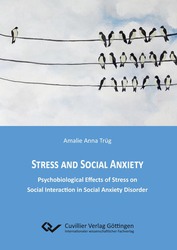| Fachbereiche | |
|---|---|
| Buchreihen (97) |
1381
|
| Nachhaltigkeit |
3
|
| Gesundheitswesen |
1
|
| Geisteswissenschaften |
2370
|
| Medienwissenschaften | 16 |
| Theologie | 57 |
| Philosophie | 102 |
| Rechtswissenschaft | 423 |
| Wirtschaftswissenschaften | 852 |
| Sozialwissenschaften | 417 |
| Sportwissenschaften | 48 |
| Psychologie | 233 |
| Pädagogik | 190 |
| Geschichtswissenschaften | 183 |
| Kunstwissenschaften | 111 |
| Kulturwissenschaften | 166 |
| Literaturwissenschaften | 117 |
| Sprachwissenschaften | 88 |
| Naturwissenschaften |
5407
|
| Ingenieurwissenschaften |
1798
|
| Allgemein |
98
|
|
Leitlinien Unfallchirurgie
5. Auflage bestellen |
|
Erweiterte Suche
Stress and Social Anxiety
Psychobiological Effects of Stress on Social Interaction in Social Anxiety Disorder
Amalie Anna Trüg (Autor)Vorschau
Inhaltsverzeichnis, PDF (66 KB)
Leseprobe, PDF (130 KB)
For people suffering from social anxiety disorder (SAD), social interactions imply severe distress. Nonetheless, little is known about the social-interactional effects of stress and the stress-related psychobiology in SAD.
The thesis presents the findings of a research project on the social-interactional consequences of acute stress in SAD patients. In contrast to healthy controls, SAD patients did not exhibit increased affiliation behavior under stress, but rather showed reduced prosocial behavior. Furthermore, the findings suggest that cognitive empathy modulates SAD patients’ way of dealing with social stress. The results extend previous data in the domain of stress reactivity and social behavior in social anxiety and provide leverage points for future studies.
| ISBN-13 (Printausgabe) | 9783736996052 |
| ISBN-13 (E-Book) | 9783736986053 |
| Buchendformat | A5 |
| Sprache | Englisch |
| Seitenanzahl | 174 |
| Auflage | 1. Aufl. |
| Erscheinungsort | Göttingen |
| Promotionsort | Freiburg |
| Erscheinungsdatum | 15.08.2017 |
| Allgemeine Einordnung | Dissertation |
| Fachbereiche |
Psychologie
Psychiatrie und psychologische Medizin |
| Schlagwörter | Stress, Stressreaktion, Soziale Angststörung, soziale Phobie, soziales Verhalten, Empathie, Cortisol, Psychobiologie, Psychoendokrinologie |








